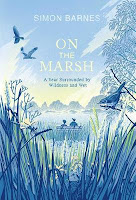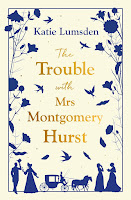So, what with visitors and being busy and Latin lessons and a huge jigsaw puzzle... I've been a bit absent, and I didn't realise it had been three weeks since I last posted! Apologies. But I have been reading, a bit anyway, and so far this month I've read four books, so an update is more than overdue!

On the Marsh by Simon Barnes, could well end up being my favourite non-fiction book of the year. (I admit it's possibly a trifle early in the year for such sweeping statements.) Simon Barnes is quite a well-known British birder, writes books and has a column in the quarterly RSPB magazine. He bought ten acres of land next to a part of the Norfolk Broads and set about restoring it to a more natural condition. The book charts the first year of their work and the birds they see as they go about said work, or just sit with a drink and observe. Simon Barnes writes beautifully and with humour about their mission, but also his family and the people that come and give him advice... and the wonderful birds of course. I loved this book to bits and would recommend it to anyone who enjoys nature writing and, in particular, watching birds. And just look at that gorgeous cover! 5 stars on Goodreads.
Next up, Vera Wong's Unsolicited Advice for Murderers by Jesse Sutano.

Vera Wong is the sixty year old owner of a tea shop in San Francisco. Sadly, it's a declining business with hardly any customers, which is a shame as Vera is an expert on Chinese tea. She has one son, who is rather neglectful, although Vera doesn't help matters by bombarding him with texts telling him how to run his life. Things change drastically when Vera comes down one morning to find a dead body in the shop. The police think the death was an accident but Vera feels otherwise and sets about investigating herself. Soon she has various suspects lined up, the dead man's wife/partner, his brother and two people the dead man was conning via a corrupt business deal. The trouble is, these suspects have rapidly become her friends. She cooks for them, looks after the dead man's child and so on, Vera doesn't want any of them to be a killer. So this was a bit of a slow burner. I was irritated by Vera at first but she slowly grew on me, it was clear she was lonely and only had people's best interests at heart. And all the wonderful descriptions of Chinese cooking and the umpteen dishes Vera made didn't actually harm either... Chinese being my favourite of the various cuisines (although Italian comes a close second.) It's very much a found family book, something I do enjoy, but it's also written with a great deal of warmth and humour which I also appreciate. 4 stars on Goodreads.
Next, A Lady's Guide to Scandal by Sophie Irwin.

Eliza Balfour has been married to the Earl of Somerest, twenty years her senior, for ten years, when she is suddenly widowed. It's not exactly a sad loss as the marriage was far from happy. A period of strict mourning must follow during which Eliza has to be careful not cause any scandal or the terms of the will mean she will be disinherited. Not wanting to stay in the mausoleum of a house, partly because she hates it but also it now belongs to the new earl whom Eliza was once going to marry, Eliza and her cousin, Margaret (loved Margaret!), set off for Bath. Eliza plans to live quietly but of course that doesn't happen or there would be no book. Lord Melville and his sister come into their lives, they are half Indian due to their father coming home from India with an Indian princess for a wife, and both are, if not exactly infamous, gossipped about a lot. Between the two men in her life, old love, the new Lord Somerset, and new love interest, Lord Melville, Eliza is very hard-put to stay out of trouble. I saw this mentioned on a You Tube channel and grabbed it for my Kindle out of interest. So glad I did as it was a wonderful Regency romp. There were definitely elements of two classic books in it, both from Jane Austen, Persuasion and Mansfield Park. The former because of the lost love returning (similar situation to Captain Wentworth), and the latter because Lord Melville and his sister reminded me of the Crawfords and their rather ambiguous lives. But most of all, this book was 'fun'. Beautifully written, so much going on, all of the characters well drawn and very individual, and a nice amount of humour to boot. I absolutely loved it. 5 stars on Goodreads.
Lastly, Can't Spell Treason Without Tea by Rebecca Thorne.

Reyna and Kianthe want to open a lovely bookshop together, with cake and tea provided and places to sit and chat and so on. Every bookworm's dream I imagine. But there's a problem. Reyna is a guard/assassin type working for the country's tyrant of a queen and leaving her employ would be treason. But after a particularly nasty incident she does a runner and heads north with Kianthe and her griffon. Kianthe has a griffon because she's basically the head mage of the world, so her disappearing into oblivion is not simple either. But they do it and end up in Tawney, which sounds a bit like a Norwegian Fjord type place where the winters are freezing and snowy, plus there are threatening dragons living in neighbouring valleys. So what happens next? Well, quite a lot and this was a fun, cosy fantasy read about found family and relationships (the romance element is quite strong). The fantasy is there in the shape of dragons and why they're attacking the village, and Kianthe's magic, but I would say it's not the strongest element of the book. I liked the world building and the bookshop was delightful but the books weren't ones you would recognise and it did feel slightly contrived. I gave this a 4 on Goodreads because it was undemanding fun, but its overall Goodreads rating of 3.74 is closer to the mark in my opinion.
So that's my reviewing up to date, it's unlikely I'll finish anything else now before the end of the month, so it's four books for me for February and that's fine.
I'm currently reading two books:
I read Lara Maiklem's Mudlark from 2019, last year, and loved it to bits. This is her new book and it's wonderful too.
Yes, still reading The Aeneid, I'm about halfway through. It's good in places, in others there's too much about battles and who was there and why and what they were wearing. But as background to my Latin lessons and to learn how connected the Greeks and Romans were, it's excellent. I plan to reread The Iliad this year and try some Ovid, but also read several of the modern retellings of Greek myths by people like Natalie Haynes, Pat Barker, Madeline Miller and so on.
I hope you're all keeping well and have had an excellent reading month in February.





















































